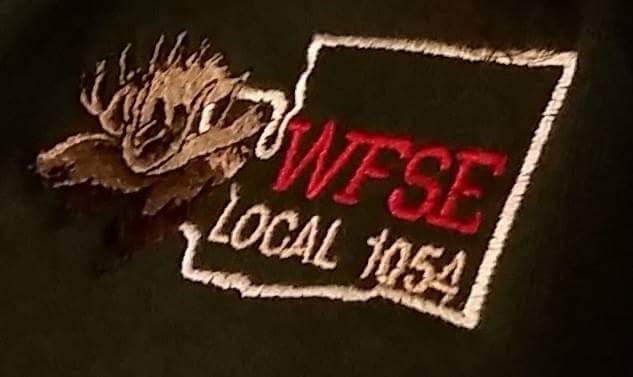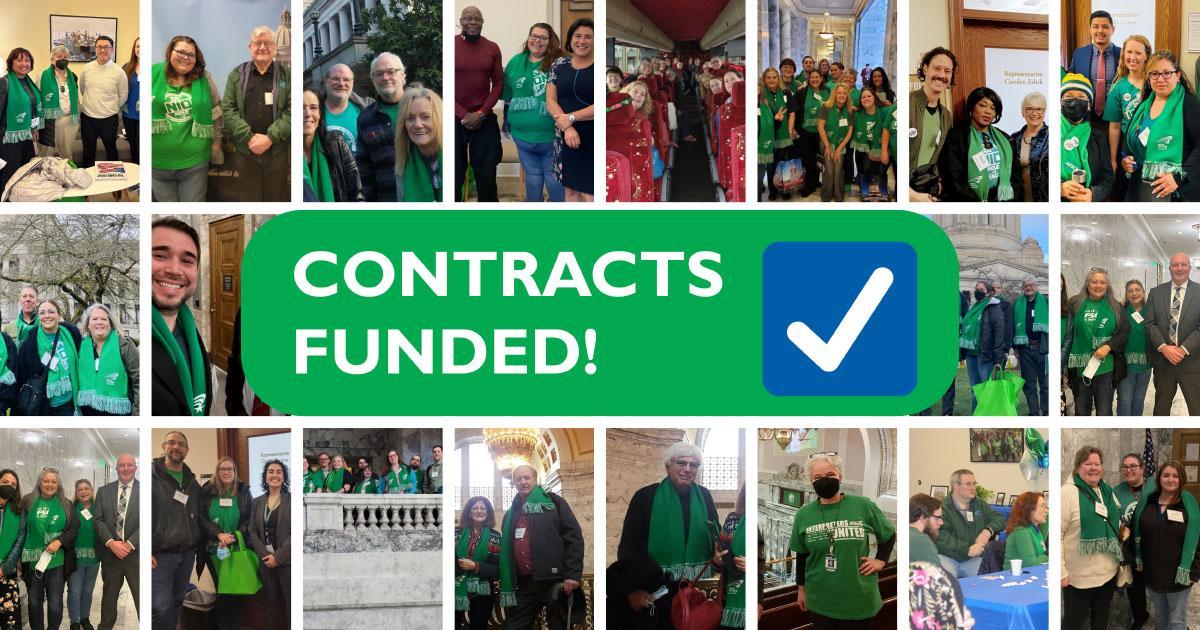WFSE members made history during the 2023 legislative session.
Together, we convinced the legislature to fund record-setting contracts that will:
- Make our workplaces safer
- Improve recruitment and retention
- Address significant pay disparities
- Improve access to vital services for all Washingtonians
All the gains in WFSE-negotiated collective bargaining agreements for 2023-25 are now official.
Download this flyer to share with your coworkers.
Jump to agency specific highlights
Legislative Wins
WFSE members spoke up for their jobs, families, and communities during the 2023 Legislative Session. We lobbied elected officials in their offices, testified in front of committees, and sent over 1200 postcards to elected leaders urging them to pass our contracts and take action on vital legislation.
New members got involved; 71% of our member lobbyists this year were taking part in our lobby program for the first time.
Our members proved, yet again, that no workforce has more at stake in the decisions made by elected officials than state employees. Jump to the bottom of this page for agency-specific highlights.
- Protecting our Health Care
Some elected officials want to increase healthcare costs for state employees. Once again, we successfully kept our premium share at 15%, and improved the health care formula to reduce employee costs: SB 5187, Sec. 908.
We also helped pass HB 1222, which requires insurance coverage for hearing instruments.
- Protecting our Pensions
All state employee pension plans were fully funded in the operating budget. WFSE successfully lobbied for SB 5350, which provides a 3 percent benefit increase to PERS/TERS plan 1 retirees.
- Protecting State Employee Privacy
One of our biggest wins this Legislative Session was the passage of HB 1533, which will make it easier for victims of domestic violence and stalking to have their personal information redacted from public records requests.
Employees who have been victims of the most frightening situations and still show up every day for our state deserve to have their vulnerable information kept safe from abusers and stalkers.
- Expanding Union Rights to More State Workers
We successfully passed HB 1122, which allows WMS employees in salary band 1 and 2 the ability to collectively bargain and join a union.
Workers across our state agencies (DOC, DSHS, etc.) in management positions perform difficult and often dangerous work. They lack a voice on the job, regular raises and everything else that comes with belonging to a union like WFSE. HB 1122 finally gives these workers the ability to advocate for themselves.
- Protecting Language Equity and Interpreter Professional Standard
Thanks to our interpreter members in Interpreters United (WFSE) Local 1671, we passed SSB 5304, which will maintain DSHS's rigorous, affordable medical interpreter testing program that interpreters, Limited English Proficient (LEP) patients, and healthcare providers have been relying on since 1995 for quality interpretation. This bill is good for LEP patients’ health outcomes, good for language equity, and good for the interpreter profession.
- Protecting Higher Ed Trades Work
WFSE trades members at our higher education institution shared their stories and helped pass SB 5385, which increases higher education bid limits and protects public employee work from outsourcing.
Higher education bid limits have not been raised since 2009, and an inflationary adjustment was long overdue. SB 5385 raises the current threshold for in-house trades work from 45K to 90k for projects involving a single trade or craft and 90K to 110K for projects involving multiple trades.
- Privacy for Union-Member Communications
Private communications between union members, stewards, and the union that represents them is essential to ensuring workplace issues are addressed. HB 1187 makes sure these kinds of communication are not subject to subpoena. A union’s duty of fair representation is diminished if employees are unable to have frank and honest dialogue with their exclusive bargaining representative.
- Reestablishing the Productivity Board
After years of lobbying, our union finally reestablished the state Productivity Board with the passage of SB 5015. The Productivity Board incentivizes and rewards state employees with a share of the money saved when their ideas make government more efficient and effective.
- Establishing a Salary Survey Workgroup
We successfully lobbied for budget proviso language that will create a Salary Survey Workgroup: SB 5187, Sec. 135 (9)
The state salary survey consistently shows many job classifications far behind fair market value, but the Office of Financial Management does not currently use the disparity between state salaries and fair market value to determine whether to grant a targeted pay increase to a given job classification, and is not currently required to accept input from state employees in creating the salary survey or the job classification specifications used in determining which positions to use to compare to state service jobs.
We won a State Salary Workgroup that will identify concerns with the state salary survey and benchmark descriptions and report back to the legislature at the end of the year. We can use this as a launching pad for a bill in 2024 with the ultimate goal of allowing the state to use the salary survey as a tool for targeted pay increases and give us the ability to have more accurate benchmark descriptions.
More Important Legislation and Agency-Specific Highlights
Our union accomplished much more this legislative session. Check out the report below from our lobbyists to find:
- DCYF agency highlights
- Corrections agency highlights
- ESD agency highlights
- Higher Ed highlights
- DSHS agency highlights
- More legislation important to state workers and working families

